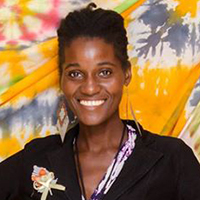THE Guyana Civil Aviation Authority (GCAA) is gearing up for future challenges even as Guyana continues its airport expansion programmes and the promising oil and gas industry opens doors for greater traffic in Guyana’s airways.
GCCA Director-General Egbert Fields, at a National Air Transport Authority (NATA) forum held recently, said several overseas large-scale helicopter operators have communicated with him to enquire about requirements to operate large helicopters here as Guyana prepares to go into oil and gas production soon.
“Over the past couple of weeks I’ve been entertaining a lot of oversees operators coming to find out what are the requirements to operate large-scale helicopters because EXXON (Mobil) has tendered out for helicopter use. So the oil/gas industry is on the horizon. Soon it will explode and all these operators are coming to get a piece of the action and the authority has got to be ready for all these challenges, and not only meet these challenges head-on just like that. We have to meet those challenges in a safe fashion, in a safe way,” Fields disclosed.
The GCCA expects many challenges and is reviewing regulations, preparing its staff and collaborating strongly with stakeholders to tackle those challenges and move the aviation industry forward.
“The authority is gearing itself to meet all those challenges of tomorrow. And the challenges, I can see them like a tidal wave coming towards us. We don’t have much time… The airport is expanding, the runway is extending, we will see a lot of visitors… gold price going up, which means that the domestic industry is gonna continue to expand,” Fields pointed out.
A revival of the industry through improvements in staffing, regulations, documentation and materials for guidance is on the cards and a grant from the Inter-American Development Bank given to Guyana will be used to develop a National Aviation Masterplan (NAM), to guide the operations and development of the industry for the next 20 years. More effective safety management procedures will also be implemented, and currently, a corrective action plan is being prepared for submission to ICAO.
“We have just surpassed the world average of 60 per cent effective implementation or compliance to (International Civil Aviation Organisation) ICAO, and once a state goes beyond or above 60 per cent, you’re expected to now implement SSP or State Safety Procedures. We are at this time proceeding with the implementation of Safety Management Systems (SMS) because when you’re successful, other things come along.”
ACTION PLAN
“We’re working feverishly to put together our corrective action plan to submit to ICAO… so the authority is moving steadfastly forward and we hope that the industry will be there riding along with us being safe and implementing the right kind of procedures,” Fields told aviators.
Research has shown that aviation plays a great part in Guyana’s economic development and as the country expands economically, aviation is expected to play a greater part.
Meanwhile, Fields said while the GCCA has a mandate to regulate, the organisation tries its best to stay away from policing but rather is willing to collaborate with aviators to create a more improved and safer industry, where pilots can feel less controlled to execute their duties professionally and comfortably.
“We facilitate the industry. We are here to ensure that the aviation industry grows in Guyana. We’re not here to restrict, we’re not here to stop operations. We’re here to walk hand in hand with you the various stakeholders in making this industry a safer industry, and to ensure that it embodies all the elements of good compliance with ICAO procedures.”
Fields recalled in the 1980s and 1990s while he was a pilot flying the Boeing 707 and 757 into New York and Miami, the Federal Aviation Administration (FAA)flight inspection processes were so tedious that it affected pilots psychologically, leaving them with the option of flying under pressure after the visit of an FAA inspections officer.
“His posture, the look he gave and that voice that sounds so demanding, it drove fear into pilots. It’s as if he is saying ‘I can stop you from flying’… and many times you wonder ‘do I have the right licence or the right medicines in my bag’… and that little bit of fear unnerved the pilot.”
However, 10 years ago while he participated in a training session with the FAA as an inspector, he recognised positive changes with the organisation acting more as facilitators than police.
“…things have changed and the inspectors and facilitators were more accommodating, and they said they have decided to change, since they realise it was not the right approach… Because you have to be aware of the fact that that pilot is now beginning his day’s work and he has another five hours to go or six hours or how much long is the flight. And he has to worry about flying that airplane, the weather, dealing with (Air Traffic Control) ATC. Why should you try to unnerve him initially?”
He said while the GCCA understands that some are liable to go wrong, it is prepared to deal with such persons professionally.
“The approach from the Civil Aviation Authority is to work with you the stakeholders to assist you, because you have safety to think about,” Fields told the aviators.












